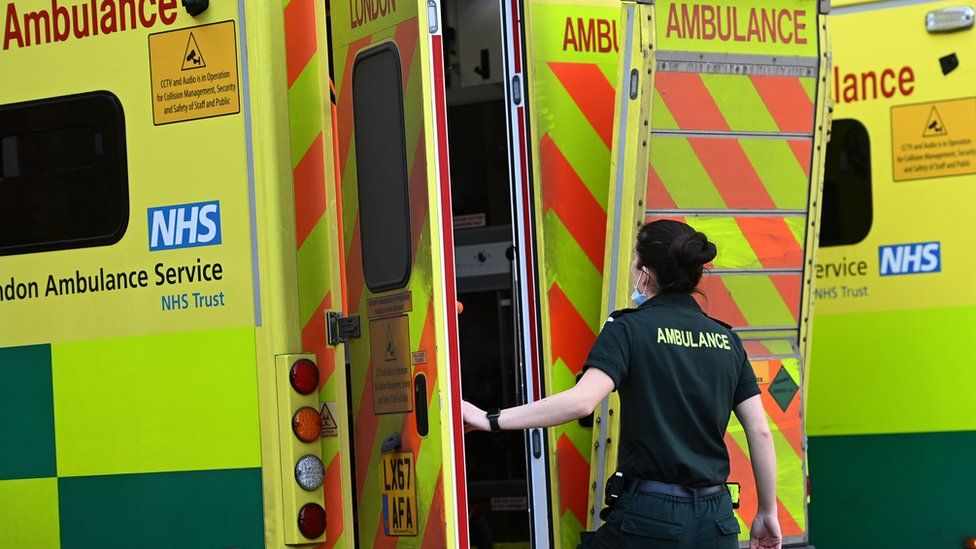ARTICLE AD BOX
 Image source, Shutterstock
Image source, Shutterstock
NHS England bosses have warned of "extensive disruption" ahead of ambulance strikes
Hospitals should free up beds to prepare for "extensive disruption" caused by ambulance staff strikes, NHS bosses have urged.
They said patients would need to be safely discharged where possible ahead of a "very challenging" period.
Ambulance staff will walk out on 21 and 28 December in a dispute over pay.
Armed forces could be deployed to hospital trusts ahead of the strikes, No10 has confirmed.
In a letter addressed to hospital bosses, NHS chiefs have called for patients who complete emergency medical care to be moved out of emergency departments.
This may involve the creation of "observation areas" and additional beds elsewhere in the hospital, Sir David Sloman, NHS England's chief operating officer, wrote in the letter co-signed by national medical director Professor Sir Stephen Powis and chief nursing officer Dame Ruth May.
Measures should also be put in place to ensure that patients arriving at hospitals in ambulances are handed over to A&E in less than 15 minutes, they said.
However, NHS Providers' interim chief executive Saffron Cordery said reducing handover delays would be "incredibly difficult to implement" because of factors including staff absences and rising flu admissions.
Ambulance handover delays in England have hit a new high, according to recent NHS data. Last week, one in six patients waited for more than an hour to be passed on to A&E teams.
The letter sent to NHS trusts and Integrated Care Boards also said bosses should create and coordinate plans on how to handle strike days by Monday 19 December.
Some outpatient appointments could be cut back to allow senior medical staff to be redeployed to emergency departments. But NHS chiefs say "every effort" should be made to maintain urgent cancer diagnostics or cancer treatment, with rescheduling to be considered as a last resort.
UNISON, Unite and GMB are taking action on 21 December. GMB union members will go on strike again on 28 December.
Following an emergency Cobra meeting on Monday, the prime minister's official spokesman said the number of ambulances available to attend calls would be reduced "significantly".
The Police Federation has suggested police officers may also be called upon to drive ambulances.
At least 19,000 patients had their surgeries and appointments postponed yesterday because of striking nurses, according to figures released by NHS trusts in England and Northern Ireland.
But ministers had predicted that a larger number of around 70,000 appointments, procedures and surgeries would be lost as a result of the strike.
Royal College of Nursing members are expected to strike for a second time on 20 December in parts of England, Wales and Northern Ireland.
It's clear that NHS leaders are very concerned about the possible impact of the ambulance strikes planned for Wednesday 21 December and a more limited walkout a week later.
The letter to hospitals urging rapid preparations, including moving as many medically fit patients as possible out, is evidence of that - with references to a "very challenging period" and involving "extensive disruption".
A senior NHS England official Sir Jim Mackey has said that action by ambulance teams represented a completely different order of magnitude of risk compared to nurses strikes. Tuesday's second nurses strike will see thousands more appointments and procedures cancelled.
The letter from health leaders suggests there may have to be more postponements of appointments on Wednesday when ambulance staff go on strike in order to allow senior doctors to be redeployed to emergency departments. All this with no sign of ministers and unions being in any hurry to start pay talks.

 2 years ago
42
2 years ago
42








 English (US) ·
English (US) ·